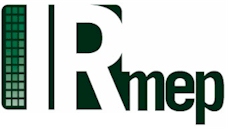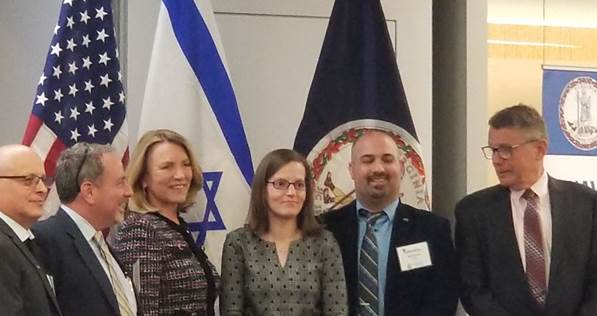Former Air Force Secretary pitches $100k “shark tank” swipes
to Israeli military contractors
Virginia Israel Advisory Board confab entwines Israeli military contractors and DoD - February 4, 2020
Tysons Corner, VA--The premise of
ABC’s business reality television series “Shark Tank” is
simple. Celebrity investor “sharks” hear proposals from
contestants pitching new product ideas. Winning ideas
receive funding. Pitches that fall short are ripped to
bloody shreds to the delight of mass audiences.
How will the concept
work for Israeli military contractors now that the U.S. Air
Force has its own shark tank? According to Deborah Lee
James, former Secretary of the U.S. Air Force, small
military contractors can immediately get a $100,000 credit
card swipe after successfully making a quick pitch.
Deborah
Lee James, former Secretary of the U.S. Air Force on
February 3, 2020
On February 3, Israeli military
contractors hoping to win big U.S. government contracts
gathered at an event organized in Northern Virginia by the
Virginia Israel Advisory Board (VIAB) and Fairfax County
Economic Development Authority (FCEDA). VIAB is an office of
Virginia’s General Assembly. Though self-designated as an
advisory board, VIAB functions more as
an Israel export
promotion council with a strange twist—it is funded
entirely by Virginia—rather than Israeli—taxpayers. VIAB’s
portfolio of projects—which often compete against home-grown
U.S. and Virginia companies—is powered by multitudes of
grants and subsidized loans. Nevertheless VIAB has generated
a string of failures due to its lack of market discipline,
self-dealing and questionable activities conducted mostly in
secret.
VIAB
Executive Director Dov Hoch, whose appointment battle
triggered VIAB's
move from the governor's office to the legislature,
celebrated Israel Aerospace Industries expansion of its
North American headquarters in Fairfax County. He also
praised Elbit System’s acquisition of Harris Night Vision
business. Hoch had kind words for Oran Safety Glass, an
Israeli company from a small kibbutz which VIAB helped
establish in Greensville County, Virginia near Emporia, and
later presented it as a case study.
Principal Deputy Director of the
Israeli Ministry of Defense (SIBAT) Paul Friedberg praised
the sixteen Israeli contractors present at the Fairfax
networking event. After words about U.S. Israeli security
cooperation, he wished success to all parties gathered in
the packed conference center. Other speakers included Eilad
Peretz, Lead Researcher for New Space Missions at NASA and
the US Department of Homeland Security’s Director of
Industry Partnerships, Security Science and Technology
Directorate Megan Mahle.
Paul Friedberg, Principal Deputy Director of the
Israeli Ministry of Defense, SIBAT
The
keynoter of the event was Deborah Lee James, 23rd
Secretary of the US. Air Force (2013-2017). After having
traveled to 44 countries during her stint, James said
nothing impressed her more than the “partnership” the U.S.
has with Israel. It is as “tight as they come.” James also
praised Israeli industry representatives’ tight connections
with “war fighters” due to their own mandatory IDF service.
There are four main opportunities for Israeli contractors,
according to James. The first is the $700 billion plus
Department of Defense budget, far more than all other U.S.
agencies (excepting Social Security and Medicare). No matter
who wins the next U.S. election, James assured the crowd,
this budget will remain at “quite a high level.”
The
second opportunity is great power conflict with China. It is
the “pacing threat” against which the U.S. military now
“measures itself.” James tipped a hat to the crowd by
counting Iran as the “other” “major power” about which the
U.S. is worried but saw U.S. focus as generally moving away
from the Middle East. Rising budgets have allowed the
Pentagon to “do more of everything” in recent years. More
people, training and equipment, particularly in the
high-tech realm.
According to James, the Air Force is preparing to move $30
billion out of legacy systems and put them into promising
high technology ventures. $9 billion will go into fully
networked, innovative command and control systems. James had
“seen some of that going on in Israel,” which was an
opportunity for those gathered in the room, and she
expressed interest in seeing what Israel could bring to the
table. The need for fast innovation is an opportunity for
“nontraditional” players. The
obstacles to speedy innovation are fading away, as new
authorities have been established for prototyping and speedy
Silicon Valley style software development, she claimed.
The U.S. Air Force has even
launched “shark tanks” or “pitch days.” According to James,
“Companies will come in, under a particular need. It might
be space, it might be hypersonics…you do a quick pitch….and
if you impress the government officials who are in
attendance, you’ll get a credit card swipe, and maybe walk
away with $100,000. These are small investments, in seed
form, but a way for companies to get involved.”
VIAB’s Israeli invitees eagerly
listened to James, and later gathered into small
business-to-business and business-to-consumer meetings.
However, most of the
Virginia Israel Advisory Board’s claimed “success”
stories have been anything but positive. Sabra Hummus—much
praised by VIAB's Dov Hoch in his introductory remarks—used
Virginia state subsidies to
seize market share from a scrappy home-grown New England
competitor operating without similar government
largesse. Sabra Dipping Company is more of a case study of
state government intervention into American consumer markets
on behalf of Israel than winner-take-all competition.
Another much-hyped VIAB success story, Oran Safety Glass,
has
financially exposed Greensville County to the extent
that it may be the reason the county recently rejected
another VIAB project—a proposal from the Israeli solar
energy producer Energix, owned by Alony Hetz. An Energix
subsidiary wanted to install one of five utility-scale solar
arrays planned for Virginia in the county. Energix and its
parent company are both heavily involved in energy and real
estate projects in Israeli occupied lands in the West Bank
and Golan Heights which Energix refers to as “unregulated”
territories. Greensville County turned down the Energix
proposal, though the city of Chesapeake is proceeding with
yet another. Aviva Frye, a long-time VIAB board member,
simultaneously served as the
U.S. representative of Energix. Frye often used her
status as a government agency representative to open doors
and clear regulatory hurdles for Energix in Virginia. Such
self-dealing is rampant at VIAB.
Presenters
Asher Kotz, Dov Hoch, Deborah Lee James, Megan Mahle, Eliad
Peretz and Paul Friedberg
Israeli fish farm company
AquaMaof soaked up $1.5 million in Tobacco Commission
subsidies in Virginia and received a $10 million loan
guarantee from the Coalfield Economic Development Authority.
But so far, the company’s claims that it will launch a huge
facility in Richlands, VA (and seize market share from
home-grown recirculating aquaculture leader Blue Ridge
Aquaculture) have had no visible results.
Nevertheless, the Virginia Israel Advisory Board—a
brainchild of Eric Cantor with a huge network of
board members who
contribute heavily to
state political campaigns—has had great success in
channeling taxpayer dollars to Israeli companies, despite
numerous failures.
Funding from Virginia’s Tobacco Region Revitalization
Commission has been particularly abundant. In 2014
VIAB Vice Chairman Charles Lessin received a $565,000
grant to develop a St Paul, VA refinery in partnership with
the Israeli company TransBioDiesel. The project was a
complete flop, but in 2019
Lessin got a questionable sweetheart deal to avoid
repaying $210,000 of the Tobacco Commission loan.
Given generally low public awareness about VIAB’s
activities—and the recent ascension of
former VIAB board member and Fairfax County
representative Eileen Filler-Corn to speaker of the state
House of Delegates—long lines of VIAB-affiliated Israeli military
contractors will likely soon be forming at U.S. Air Force
"shark tank" swiping stations.
Grant F. Smith is the author of
the new book
The Israel Lobby Enters State Government. He is director
of the Institute for Research: Middle Eastern Policy
IRmep in Washington,
D.C. which co-organizes
IsraelLobbyCon
each year at the National Press Club.
|




